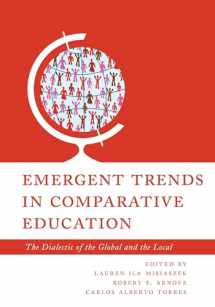
Emergent Trends in Comparative Education: The Dialectic of the Global and the Local (Volume 1)
Book details
Summary
Description
Emergent Trends in Comparative Education: The Dialectic of the Global and the Local addresses the changes and multiple new topics that arise in education vis-à-vis processes of globalization and social transformation. As such, it complements and expands the scope of Comparative Education: The Dialectic of the Global and the Local, Fifth Edition. Chapters systematically examine the intersecting global crises in society and education occasioned by COVID-19, across types and levels of education, geographic and linguistic contexts, and fields of theory and practice. Topics addressed include the African ethic Ubuntu, Global Citizenship Education (GCE), UNESCO, STEM, teacher education, low-fee schools, social movements and protest, ecopedagogy, sustainability, media and technology, testing, and the economics of education. Furthermore, this book offers insight into how education systems can contribute to environmental social justice. Various authors employ a social justice lens to analyze the global-regional-local dialectics shaping the working of education systems with regard to who pays for and who benefits from current policy initiatives around the world.


We would LOVE it if you could help us and other readers by reviewing the book
Book review



